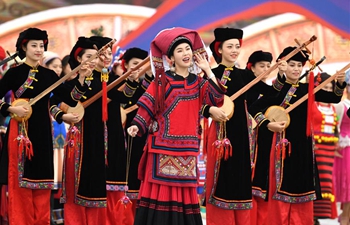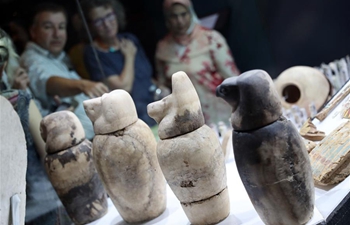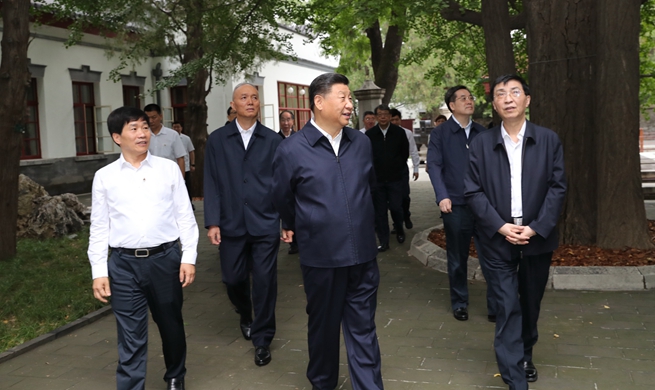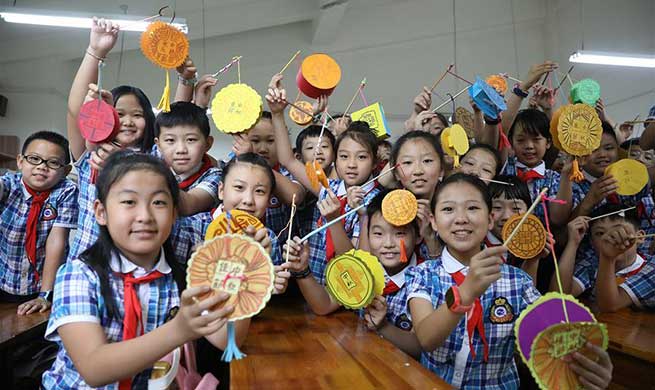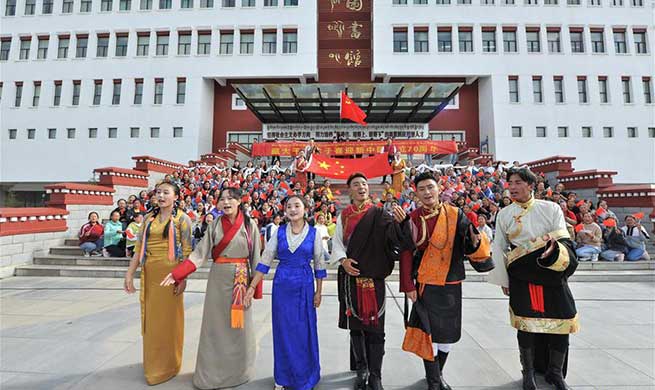BEIJING, Sept. 12 (Xinhua) -- A 2,000-year-old eight-piece set of bronzeware belonging to Chinese cultural heritage was brought back home from Japan in August following five months of pursuit by Chinese authorities.
It is among the most-valued relic sets that have been successfully sought and brought back to China in recent years after their illegal trade on the international market was stopped, according to officials with China's National Cultural Heritage Administration (NCHA).
Dating back to the Spring and Autumn Period (770 B.C.-476 B.C.), the set of eight bronze utensils will join other treasures China has successfully retrieved from overseas for an upcoming Beijing exhibition themed the country's pursuit of its lost cultural heritage items.
Indeed, recent years have witnessed major achievements in the regard thanks to greater efforts by Chinese authorities as well as intensified international cooperation.
TREASURE COMES HOME
In February 2019, the United State announced the repatriation of 361 relics, which were recovered by the U.S. Federal Bureau of Investigation in a 2014 operation, to China.
This is the largest single batch of relics and artifacts returned from the United States since 2009 when the two countries signed a memorandum of understanding (MoU) to enhance cooperation in this regard.
The repatriation was the fruit of long-term cooperation between the two countries and a great example for global relics preservation efforts, according to Hu Bing, deputy head of NCHA.
In April, in what was hailed by China's culture and tourism minister Luo Shugang as the biggest cultural relic repatriation for China in almost two decades, 796 pieces of relics and artifacts returned from Italy.
This happened more than 10 years after the Chinese relics were discovered in Italy by local authorities in 2007. For the repatriation of the items, much work was done by China and Italy to settle related legal problems and make necessary preparations.
Since the founding of the People's Republic of China in 1949, around 300 batches, totaling 140,000 pieces, of Chinese relics have been retrieved from overseas through law enforcement cooperation, lawsuits, negotiations and donations and other means, according to an NCHA statement posted online Tuesday.
FIGHTING ILLEGAL TRANSFER OF RELICS
Speaking at this week's press conference on the bronze relics' return from Japan, Guan Qiang, deputy head of the NCHA, said the repatriation was made possible by the joint efforts of China's diplomatic, cultural and public security departments, as well as the cooperation of the Japanese government.
"Every time I read the news that a relic is brought home, I can't help feeling that precious relics once lost can now come back because our country is not what it was," an internet user commented, hinting that greater attention is being paid by China to cultural heritage preservation and protection.
As one of the first countries to have an approval and supervision system governing the cross-border transfer of cultural heritage items, China since the 1980s has been steadily improving laws and rules for cultural heritage protection and stepped-up law enforcement and international cooperation to crack down on relics-related crimes.
In 1989, China accepted the 1970 UNESCO Convention on the Means of Prohibiting and Preventing the Illicit Import, Export and Transfer of Ownership of Cultural Property and has since entered into bilateral agreements on fighting illegal transfer of and facilitating the repatriation of relics with more than 20 countries.
To prevent the illegal transfer of relics out of China, the country has also set up 21 institutions for approval and supervision regarding relics' cross-border transfer.
Meanwhile, Chinese authorities unveiled a database of stolen foreign relics in 2018 to prevent them from circulating in China.
"Each and every relic is an inseparable part of China's cultural heritage and is forever treasured by the Chinese people," Luo Jing, an NCHA official, told Xinhua.
Luo said China will continue to join international efforts for cultural heritage preservation and protection.






